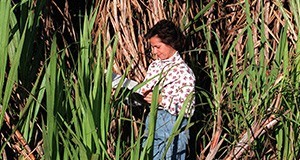Abstract
Sands used in sugarcane production in Florida have low levels of organic matter, silt, and clay, and they provide little nitrogen (N) through mineralization of organic matter and possess a low capacity for N retention as a result. Because these soils are highly leachable, N must be managed well to ensure adequate nutrition for the crop as well as protection of groundwater. This new 4-page fact sheet is part of the Sugarcane Handbook, and it discusses sand soils used in sugarcane production, sugar yield response to nitrogen, and revised nitrogen recommendations. Written by J. Mabry McCray, Kelly T. Morgan, and Les Baucum, and published by the UF Agronomy Department, February 2016.
References
Gascho, G. J., and C. E. Freeman. 1974. Fertilizer Recommendations for Sugarcane. Belle Glade AREC Research Report EV-1974-18. Gainesville: Florida Cooperative Extension Service, University of Florida.
McCray, J. M., K. T. Morgan, L. Baucum, and S. Ji. 2014. "Sugarcane yield response to nitrogen on sand soils." Agronomy Journal 106: 1461-1469. https://doi.org/10.2134/agronj13.0513 https://doi.org/10.2134/agronj13.0513
Muchovej, R. M., and P. R. Newman. 2004. "Nitrogen fertilization on a sandy soil: II. Soil and groundwater analyses." Journal of American Society of Sugarcane Technologists 24: 225-240.
Obreza, T. A., D. L. Anderson, and D. J. Pitts. 1998. "Water and nitrogen management of sugarcane grown on sandy, high-water-table soil." Soil Science Society of America Journal 62: 992-999. https://doi.org/10.2136/sssaj1998.03615995006200040021x https://doi.org/10.2136/sssaj1998.03615995006200040021x
Rice, R. W., R. A. Gilbert, and J. M. McCray. 2010. Nutritional Requirements for Florida Sugarcane. SC028. Gainesville: University of Florida Institute of Food and Agricultural Sciences. http://edis.ifas.ufl.edu/sc028 https://doi.org/10.32473/edis-sc028-2010
VanWeelden, M, S. Swanson, W. Davidson, and R. Rice. 2018. Sugarcane variety census: Florida 2017. Sugar J. 81(2):10-19.


